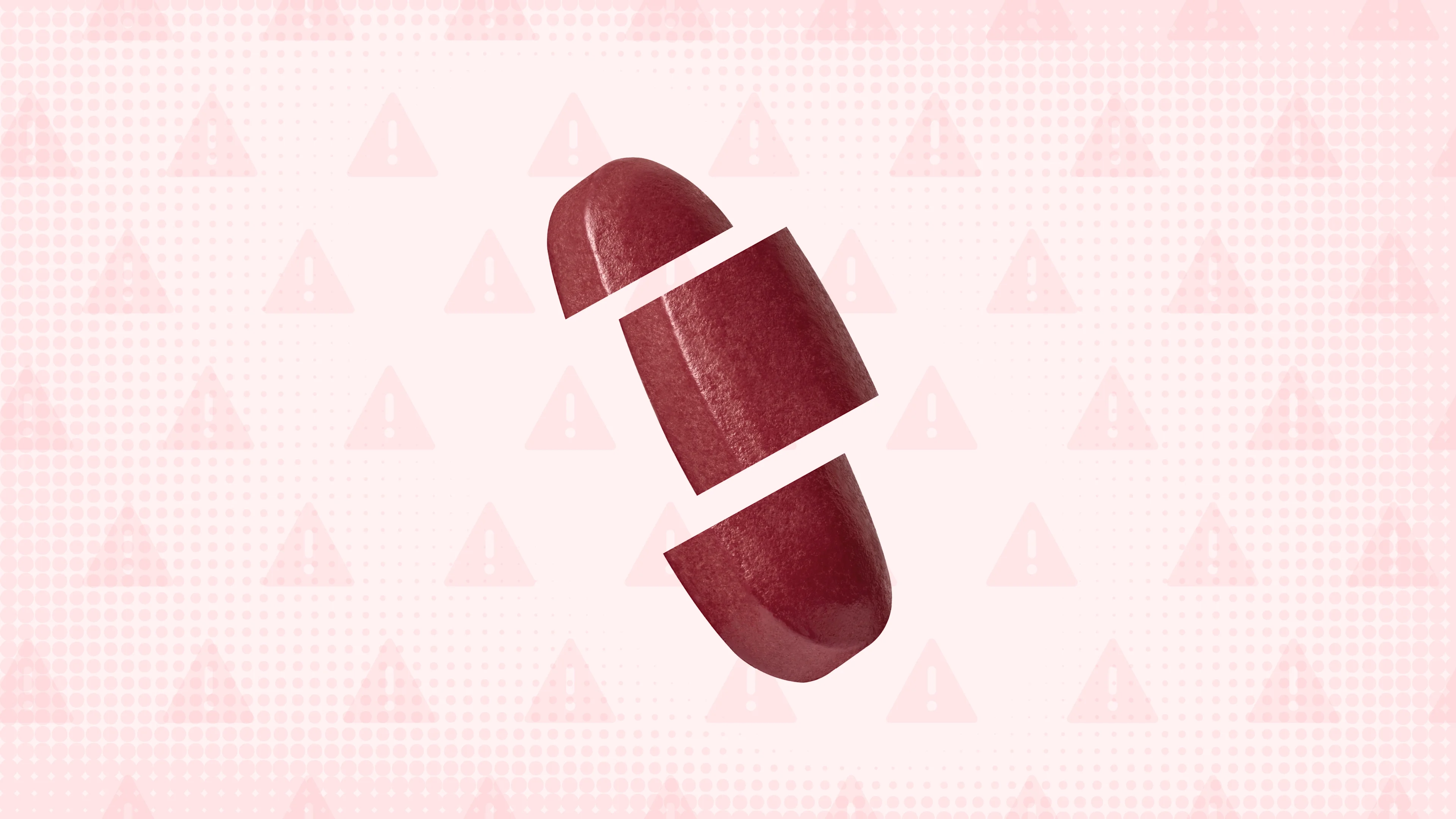Key takeaways:
Premarin (conjugated estrogens) is a medication taken for menopause symptoms, such as hot flashes and night sweats. Common Premarin side effects include headache, sore breasts, and nausea.
Other Premarin side effects include trouble sleeping, depression, and vaginal irritation. Back pain and leg cramps are also possible.
Serious Premarin side effects include an increased risk of blood clots, heart attack, and certain cancers. Dementia may also be more likely for women over age 65. Taking the lowest effective Premarin dose for the shortest time needed can reduce these risks.
There are several ways to save on Premarin. GoodRx can help you access Premarin at an exclusive cash price of $99 per month. Manufacturer savings cards and patient assistance programs are also available.
Save on related medications
Menopause is the time of life when estrogen levels fall and your periods stop for good. As estrogen levels go down, you may experience hot flashes, night sweats, and bothersome vaginal symptoms.
Premarin (conjugated estrogens) is a combination of different estrogens made from an animal source — the urine of pregnant horses. Premarin is most often used as menopausal hormone therapy (MHT). MHT replaces estrogen to help relieve moderate to severe symptoms of menopause.
But MHT isn’t without risks. Knowing about the possible side effects of Premarin can help you know what to expect while taking it. It can also help you talk to your healthcare team about whether it’s a safe option for you.
Premarin side effects at a glance
Below are common and rare Premarin side effects to be aware of. Keep in mind that this isn’t a complete list. So be sure to speak with your healthcare team about any side effects that occur while you’re taking Premarin, even if they aren’t listed below.
Keep in mind that these side effects apply to oral Premarin tablets. We cover the side effects of Premarin vaginal cream in another GoodRx article.
Common Premarin side effects include:
Headache
Breast pain
Nausea
Stomach pain
Gas
Vaginal discharge
Back or leg pain
Mood changes
Trouble sleeping
Feeling weak
Fluid retention
Vaginal infections
Itchy skin



Rare, but serious Premarin side effects include:
Vaginal bleeding
Gallbladder disease
Vision changes
Premarin also has several boxed warnings, the FDA’s most serious medication warning. These include:
Increased risk of dementia
Increased risk of blood clots
Increased risk of heart attack and stroke
Increased risk of breast cancer
Increased risk of uterine cancer (if taken without a progestin)
Let’s take a closer look at 11 Premarin side effects and how to manage them.
1. Headache
Headache is the most common Premarin side effect. Headaches are often associated with changes in hormone levels. Taking your Premarin dose at the same time every day may help prevent this side effect.
If headaches do occur, over-the-counter (OTC) pain medications are a good option for treatment. This includes medications like acetaminophen (Tylenol) or ibuprofen (Advil, Motrin).
Typical dosages: Some Premarin (conjugated estrogens) interactions are managed by changing your dose. Learn about typical and maximum Premarin dosages here.
Compare your options: Premarin is one of several available menopause treatments. Learn about the different options and how to save on them.
Premarin cost: Learn how much Premarin costs without insurance, along with ways to save on your prescription.
If headaches are severe or happen often, let your prescriber know. They may suggest trying a topical or vaginal form of estrogen to see if that makes a difference.
Good to know: A sudden, severe headache can also be a sign of a stroke, especially if it happens along with vision changes or one-sided weakness. If these symptoms occur, seek emergency care right away.
2. Breast pain
Breast pain or tenderness is another common side effect of Premarin. Higher doses of Premarin seem to cause this side effect more often than lower doses.
Less often, Premarin may make your breasts larger. It can also increase your risk of breast cancer — more on that later.
For sore breasts, an OTC pain reliever or cold compress may help. But if it gets worse or becomes too bothersome, talk to your prescriber for guidance.
3. Stomach pain, nausea, and gas
In some people, Premarin can cause stomach pain, nausea, and gas.
You can take Premarin with or without food. But taking it with food may help if it’s upsetting your stomach. For gas or stomach pain, try an OTC gas-reliever, such as Gas-X. This may help relieve pain caused by gas build-up in your gut.
Severe nausea or stomach pain is not normal while taking Premarin. Discuss these symptoms with your healthcare team if they occur. There may be something else causing them.
4. Vaginal discharge
Increased vaginal discharge or irritation of the vagina (vaginitis) can happen while taking Premarin. In most cases, these side effects aren’t serious. But they can be bothersome and make sexual activity painful.
Sometimes, these symptoms can be a sign of infection. If you notice an odor or change in the color or feel of your vaginal discharge, contact your prescriber.
OTC personal lubricants can help reduce vaginal pain and irritation. Vaginal estrogen products may also help. Avoid douching and wearing tight clothing. This can increase your risk of vaginal infections and worsen vaginitis.
If you notice blood in your vaginal discharge, contact your prescriber right away. This can be a sign of a more serious issue.
5. Pain
Premarin may also cause pain in areas other than the breasts and vagina. This isn’t a common side effect, but it’s still one to be aware of. Some people describe back pain, leg cramps, or pain in their pelvis while taking Premarin.
In general, feelings of pain can usually be managed with OTC pain medication. But if your pain is associated with trouble breathing, a warm, swollen area of your leg, or is in your chest, seek emergency care. In this case, it may be a more serious issue, such as a blood clot or heart attack.
6. Depression
Some people experience mood changes during menopause. Often, taking Premarin will help balance your mood. But new or worsening depression was also a reported side effect during clinical studies.
If you experience depression while taking Premarin, speak to your prescriber. They may suggest a non-hormonal medication for management of your menopausal symptoms. Some antidepressants — such as paroxetine (Brisdelle) — may also be useful in managing hot flashes and night sweats as well as depression symptoms.
7. Trouble sleeping
Like depression, some people notice an improvement in their sleep while taking Premarin. This is because it helps stop the night sweats and hot flashes caused by menopause. But some people find they have more trouble sleeping while taking Premarin.
In this case, try taking Premarin in the morning. For some, this may help with insomnia. An OTC melatonin supplement may also be helpful. If you’re unable to tolerate the sleep changes that come with Premarin, talk to your prescriber. They may recommend a non-hormonal treatment instead.
8. Dementia
Premarin has been shown to increase the risk of developing dementia in women over the age of 65. The effect on younger women hasn’t been studied. But it’s recommended to limit MHT to the lowest possible dose and shortest period of time possible to reduce this and other serious risks.
If you’re over age 65 and considering Premarin, speak with your healthcare team about the possible risks and benefits first.
9. Gallbladder disease
Some people have had problems with their gallbladder while taking Premarin. And some have needed their gallbladder removed. If you notice pain in the upper right side of your stomach, nausea, or yellow-colored eyes or skin (jaundice), contact your prescriber. These may be symptoms of gallbladder disease.
10. Cardiovascular disorders (blood clots, heart attack, stroke)
The Women’s Health Initiative (WHI) was a nationwide study that looked for common causes of death in women after menopause. The WHI found an increased risk of blood clots, stroke, or heart attack in people taking Premarin plus a progestin. And an increased risk of stroke with Premarin alone.
There are symptoms you should never ignore when taking Premarin.
Symptoms of blood clots in the lung — shortness of breath or chest pain.
Symptoms of blood clots in the leg — leg pain or swelling.
Symptoms of a stroke — trouble talking, walking, or drooping on one side of the face. Numbness, tingling, or weakness can also happen.
Symptoms of a heart attack — severe chest pain, chest tightness, or pain that radiates up the arm, neck, or jaw.
If you experience any of these symptoms, call 911 or seek emergency medical attention right away.
11. Increased risk of certain cancers
Premarin has also been associated with an increased risk of uterine and breast cancers.
If you have a uterus, you’ll need to take a progestin along with Premarin to lower your risk of uterine cancer. But in turn, this combination may increase the risk of developing breast cancer. However, the risk of developing breast cancer returns to normal within 3 years after stopping treatment.
As mentioned, taking the lowest dose of Premarin for the shortest time necessary is recommended to reduce these risks. This can be different for everyone. But it’s good to know that the longer you take Premarin, the more risk there is for serious side effects to happen.
Be sure to perform regular breast exams to screen for any changes in your breast tissue. If you notice lumps, changes to the nipple, or pain, contact your healthcare team.
Unexplained vaginal bleeding, bloody discharge, or pelvic pain may be symptoms of uterine cancer. Seek medical care right away if you notice any of these symptoms.
How to save on Premarin
There are ways to save on Premarin, which is available as a brand-name medication. GoodRx can help you navigate between patient assistance programs and copay savings cards to save money on your prescription:
Save with GoodRx. Anyone with a valid prescription, regardless of insurance status, can use GoodRx to purchase Premarin at an exclusive cash price of $99 per month.
Save with a copay savings card. If you have commercial insurance, you may be eligible to pay as little as $25 per month for Premarin tablets using a savings card from the manufacturer.
Save with a patient assistance program. If you’re uninsured or underinsured, you may be eligible for Premarin’s patient assistance program, which offers the medication free of cost.
The bottom line
Premarin (conjugated estrogens) is a menopausal hormone therapy option that treats moderate to severe menopause symptoms. Common Premarin side effects include headache, breast tenderness, and stomach issues. Some people also report trouble sleeping, depression, and vaginal irritation while taking Premarin.
Serious Premarin side effects include an increased risk of blood clots, heart attack, and certain cancers. Dementia may also be more likely for women over age 65. Taking the lowest effective Premarin dose for the shortest time needed can help reduce the risk of serious side effects.

Why trust our experts?


References
American Cancer Society. (2015). Menopausal hormone therapy and cancer risk.
Anderson, G. L., et al. (2004). Effects of conjugated equine estrogen in postmenopausal women with hysterectomy. Journal of the American Medical Association.
Baker, F. C., et al. (2018). Sleep and sleep disorders in the menopausal transition. Sleep Medicine Clinics.
Chlebowski, R. T., et al. (2020). Association of the menopausal hormone therapy with breast cancer incidence with mortality during long-term follow-up of Women’s Health Initiative clinical trials. Journal of the American Medical Association.
Maki, P. M., et al. (2012). Hormone therapy, dementia, and cognition: the Women’s Health Initiative ten years on. Climacteric.
Rossouw, J. E., et al. (2002). Risks and benefits of estrogen plus progestin in healthy postmenopausal women. Journal of the American Medical Association.
Silberstein, S. D., et al. (1993). Sex hormones and headache. Journal of Pain and Symptom Management.
Wyeth Pharmaceuticals. (2025). Premarin- estrogens, conjugated tablet, film coated [package insert].















